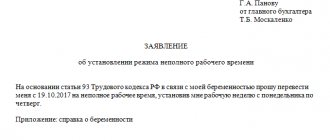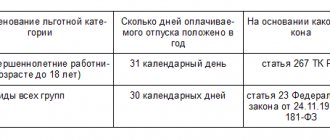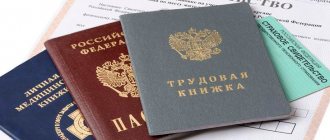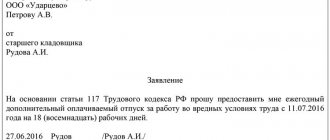In addition to the general benefits that are provided on the basis of the current federal legislation (free travel and services in the healthcare system, tax privileges, the right to additional leave at work, including at one’s own expense), the legislation of the subject of the Russian Federation in which the working pensioner or veteran lives labor, social guarantees are formed.
Also, labor veterans are guaranteed the use of annual leave at a convenient time and the provision of rest without pay for up to 60 calendar days a year.
. The employer’s refusal in this part will be considered unlawful and can be appealed in court.
The employer is obliged to provide working pensioners (by age) with time off without pay for up to 14 calendar days a year (Part 2 of Article 128 of the Labor Code of the Russian Federation). Time off is provided regardless of the type of employment contract concluded with the pensioner. The time is counted towards the employee’s total continuous work experience.
If a retired employee is disabled (regardless of the disability group), he has the right to an extended basic leave of 30 calendar days (Part 5, Article 23 of the Federal Law of November 24, 1995 No. 181-FZ “On Social Protection of Disabled Persons in the Russian Federation” ). To do this, the employee must write a corresponding application.
Who is considered a labor veteran?
A labor veteran is a person who has worked conscientiously for more than 15 years in one industry, and whose final calculation of work (insurance) length of service includes 20 years for women and 25 years for men. This category of people has certificates of gratitude, they are also marked with orders and insignia. The title of labor veteran first appeared after the adoption of the law of January 12, 1995 No. 5-FZ “On Veterans”.
The following categories of citizens can be classified as labor veterans:
- Individuals who began their professional activities without reaching full age at the start of the Great Patriotic War. However, the total insurance period must total at least 40 years for men, and 35 years for women.
- Citizens who were awarded awards, medals, orders and titles of the Russian Federation and the USSR.
Registration of leave for labor veterans
Taking the existing legal framework as a basis, it can be stated that if an employee is retired due to age, the employer cannot refuse to provide leave.
Compared to annual leave, free additional leave does not imply financial compensation for non-use, and it is also not cumulative over the years of work and is not carried forward to the future.
Leave is issued by order (form T-6) based on the employee’s application, which contains a resolution from the head of the enterprise to provide such leave. Without this document (which the vacationer must familiarize himself with), absence from work is classified as absenteeism.
Indexation of pension cash payments
Pensioned workers have the right to an annual recalculation of their pension, as there is a constant increase in pension points.
If such an employee is officially employed, the employer constantly makes social contributions to the state, including to the pension fund. In this case, unaccounted points accumulate.
Pension payments are recalculated annually in August. If there are points that have accumulated during this year, they are added to the amount in the pensioner’s personal account. This happens every year until a person retires.
Providing leave without pay
The existing regulatory framework provides that the employer undertakes to provide the working pensioner with administrative time off, not paid for with wages, if the latter writes and submits a handwritten application (a. 3, part 2, article 128 of the Labor Code).
Unpaid leave for labor veterans by the employer is an incentive, a benefit that is assigned to the employee at the regional legislative level. The employee decides whether to use it or not.
Every employee who has retired due to age, but is still working, has the opportunity to take 14 days of free rest. The resulting period is issued as one term or is divided into several parts. This item is considered and discussed by the two parties to the working relationship.
A working veteran of labor has the opportunity to apply for an additional period of 30 days, which is normatively indicated in Art. 128 TK. Only the employee himself decides whether to issue it or refuse it. He can also reduce the number of days based on need. Time off is processed in the same way as for pensioners who continue to work, with the exception of the period.
Categories of citizens who have the opportunity to take free days without payment at the required time:
- One of the parents, if the child is disabled, or one of them is undergoing long-term treatment in a clinic, provided that there are two children and both are under 15 years old - up to 14 calendar days per year.
- Veterans of war and labor - about 30 calendar days.
- Citizens who have invaluable services to the Fatherland - up to 14 unpaid days.
- Persons who have distinguished themselves by significant merits – up to 21 calendar days.
- Pensioners who retired due to age, as well as disabled people of group III - up to 30 free days.
- Citizens with II or IV disability group - up to two months (60 calendar days).
In all other cases, free days are provided in accordance with the general provisions
.
If there are several categories that make it possible to register days without pay, then the beneficiary must independently determine the article for which additional leave will be provided. The number of days is determined by the legal framework.
Important! If the unused basic leave is retained by the employee and transferred to the next calendar period, then this does not apply to additional leave for a working pensioner or labor veteran without pay - it is not transferred or accumulated, and, therefore, is not compensated for in the calculation (since .free).
Labor Code of the Russian Federation on granting administrative leave to employees
The specifics of providing days off at the employee’s expense are described in separate provisions of the Russian Labor Code. Additionally, the rights of employees who are on the company's payroll to administrative leave are regulated by a collective agreement.
These legal acts provide grounds, valid reasons for taking vacations without pay, and the duration of such days off per year. The table below shows the articles of the Russian Labor Code regarding administrative leave.
| Article of the Labor Code of Russia | Issues covered |
| 128 | Providing administrative leave to preferential categories of persons (disabled persons, participants of the Second World War, widows of military personnel, etc.) and in certain life situations (death of a relative, birth of a child, registration of marriage). |
| 173, 174 | Registration of vacations for employees who work and at the same time receive a new specialty at an educational institution. |
| 263 | Rules for granting additional days off to employees who have minor children and care for disabled children under a collective agreement. |
| 286 | Peculiarities of regulating administrative leave for citizens who combine two or more jobs. |
| 319 | Providing an additional day off for persons acting as guardians, foster parents or trustees who work in the Far North or similar areas. |
Registration process
Based on Art. 128 of the Labor Code, it is obvious that the employer is not obliged to provide an employee with additional free days and can easily refuse. Provided that the employee does not fall under the categories of citizens to whom this right is guaranteed by the state.
Interested workers should know that Art. 126 of the Labor Code of the Russian Federation provides for the opportunity to replace part of the rest with monetary compensation.
To officially register leave, a labor veteran must write an application from which the employer will receive the following information:
- Full name and position held by the employee;
- the reason why there was a need to receive free days;
- the period during which the employee must be absent.
Having received a statement according to the sample, the manager puts a resolution according to which the decision is either positive or negative. Based on the consent of the director, an order is created at the enterprise for additional leave of absence for the employee.
If a labor veteran is in a category that is entitled to vacation days by law, then you don’t have to wait for the creation of a regulatory document (order) and go on vacation
. If the decision depends on the wishes of the employer, then the correct action would be to wait for the internal document, otherwise non-presence at an individual workplace may be determined and designated as absenteeism.
The employee is required to read and personally sign the order confirming that he is familiar with it.
Important! In the same way, all this is formalized with an application and order at a time convenient for the veteran for the required number of days (but not exceeding those specified by law). The administration does not have the right to refuse to provide additional leave to labor veterans without pay, citing production necessity. Otherwise, this issue will be resolved in court.
An example of calculating additional leave for labor veterans
In order to correctly calculate the amount of free vacation days a labor veteran is entitled to, we will give an example of calculating these days based on the total amount of time worked in hazardous conditions.
For example, an employee worked from the beginning of September 2021 to the end of July 2021. The total number of working days for this period is 226. Of this number, 184 days were spent working in hazardous conditions.
- Let's calculate how many days a labor veteran worked in each month out of eleven:
divide 226 days by 11 months = 20.55 days per month. - Let's determine the total period of work in risky conditions:
divide 184 days by 20.55 days = 8.95 months. In this case, the fractional number is rounded up, provided that the remainder after the decimal point means that more than half of the working month has been worked. - Let's calculate how many free days an employee is entitled to for 9 months of insurance coverage, provided that the employee is given 24 days a year:
divide 24 days by 12 months = 2 days.
So, for each month worked in harmful conditions, 2 days of additional rest are required. That means 9 months – 18 days.
If the final calculations result in a fractional number (for example, 15.7 days), then, according to the letter of the Ministry of Health and Social Development of Russia dated December 7, 2005, it is rounded up, that is, the duration of the vacation will be 16 days.
One of the benefits for labor veterans includes the provision of leave without pay for a period of 30 days, which can either be issued or not. All registration requirements for labor veterans are the same as for working pensioners (except for the duration of free days).
How many days can I take?
The duration of unpaid leave for a labor veteran of retirement age should not exceed two weeks.
If the employee belongs to a preferential category, then he may request that he be provided with a longer rest period at his own expense. For example, WWII participants have the right to count on 35 calendar days of additional days off. If an employee is disabled, then according to the current legislation of Russia he is entitled to leave without pay for 60 days.
Dear readers! To solve your problem right now, get a free consultation
— contact the duty lawyer in the online chat on the right or call: +7 Moscow and region.
+7 St. Petersburg and region. 8 Other regions of the Russian Federation You will not need to waste your time and nerves
- an experienced lawyer will take care of all your problems!
Duration of vacation
Basic leaves for working veterans are provided on general terms. The duration of the period should not be below a certain minimum. This limit is twenty-eight actual days. This period does not include days that are declared general non-working days.
Rest is longer for pensioners who have a special status or work in specific structures:
- physically limited – 30 days;
- specialists of educational institutions from 42 to 56 days, depending on the status of the organization;
- employees of state budgetary authorities - 30 days;
- rescue specialists – from 30 to 40 days;
- working in judicial and supervisory authorities - from 30 to 48 days;
- those with a doctorate or candidate of science degree – 48 and 36 days, respectively.
Added days are also provided based on the specifics of professional activity, the place where the work is actually performed and the duration of daily work. First of all, these are added breaks during the working day, the duration of which may exceed the established time frame.
The company’s internal rules may also establish a longer duration of vacation. It should be noted that this type of rest is provided to a person in any case, regardless of whether he worked outside the norm or not.
The next type of rest is a break due to the presence of harmful and dangerous factors in the activity. The duration of such a period should not be less than seven days. In practice, as a rule, internal and industry regulations establish a longer duration of vacations of this type.
For those who work in the Far North and equivalent territories, additional days of rest and recovery are also provided. In this case, twenty-four days will be provided for workers in the North, and sixteen days for those working in similar territories.
The current legislation defines time off at their own expense for working pensioners as another opportunity to relax, recover and solve personal problems. This opportunity for the worker is unconditional, that is, leave without pay for pensioners is provided by the company in any case. This period is equal to fourteen days.
The indicated 14 days are used by the worker throughout the year, together or in parts. Unused time does not carry over to the next year
. These 14 days are not compensated by money.
How to get extra days off
The procedure for agreeing to receive additional days of rest for labor veterans is different in that it is declarative in nature. In other words, if the main leave is given to employees on the basis of an approved schedule, then in the case under consideration the veteran must notify the employer by sending him a report at any time convenient for him.
The document itself is drawn up in the name of the head of the organization. It is a mandatory requirement to indicate the start and end dates of the vacation in the application.
As for how many days before the vacation itself to submit an application, there are no clear instructions in the Labor Code in this case. It is best to write it one week before the expected date, since during this time the employer will be able to prepare the necessary administrative documents and make adjustments to the organization of the work process caused by the unplanned absence of the employee.
Legislation
Art. 116 of the Labor Code regulates that free leave, as well as the main one, should be counted on by people whose job descriptions are carried out under conditions of risk or are harmful.
A retired working person is not entitled to an additional type of rest, in such a case that he is classified among the groups of people mentioned in Art. 116 of the Labor Code, or this type of incentive is agreed upon and approved in the contract signed by the employer.
The regulatory framework governing the work of pensioners and labor veterans:
- Article 64 of the Labor Code of the Russian Federation “Guarantees for concluding an employment contract.”
- Article 80 of the Labor Code of the Russian Federation “Termination of an employment contract at the request of the employee (at his own request).”
- Article 128 of the Labor Code of the Russian Federation “Leave without pay.”
- Article 179 of the Labor Code of the Russian Federation “Preemptive right to remain at work in the event of a reduction in the number or staff of employees.”
- Article 16 of the Federal Law “On Veterans”.
Medical benefits
Working people of retirement age also have the right to:
- full medical examination once every 3 years;
- annual free vaccination against influenza strains.
If a pensioner has the status of a labor veteran, there are even more benefits:
- 50% discount on medications prescribed by a doctor during outpatient treatment;
- free dental treatment in municipal hospitals;
- production or repair of dentures free of charge.










